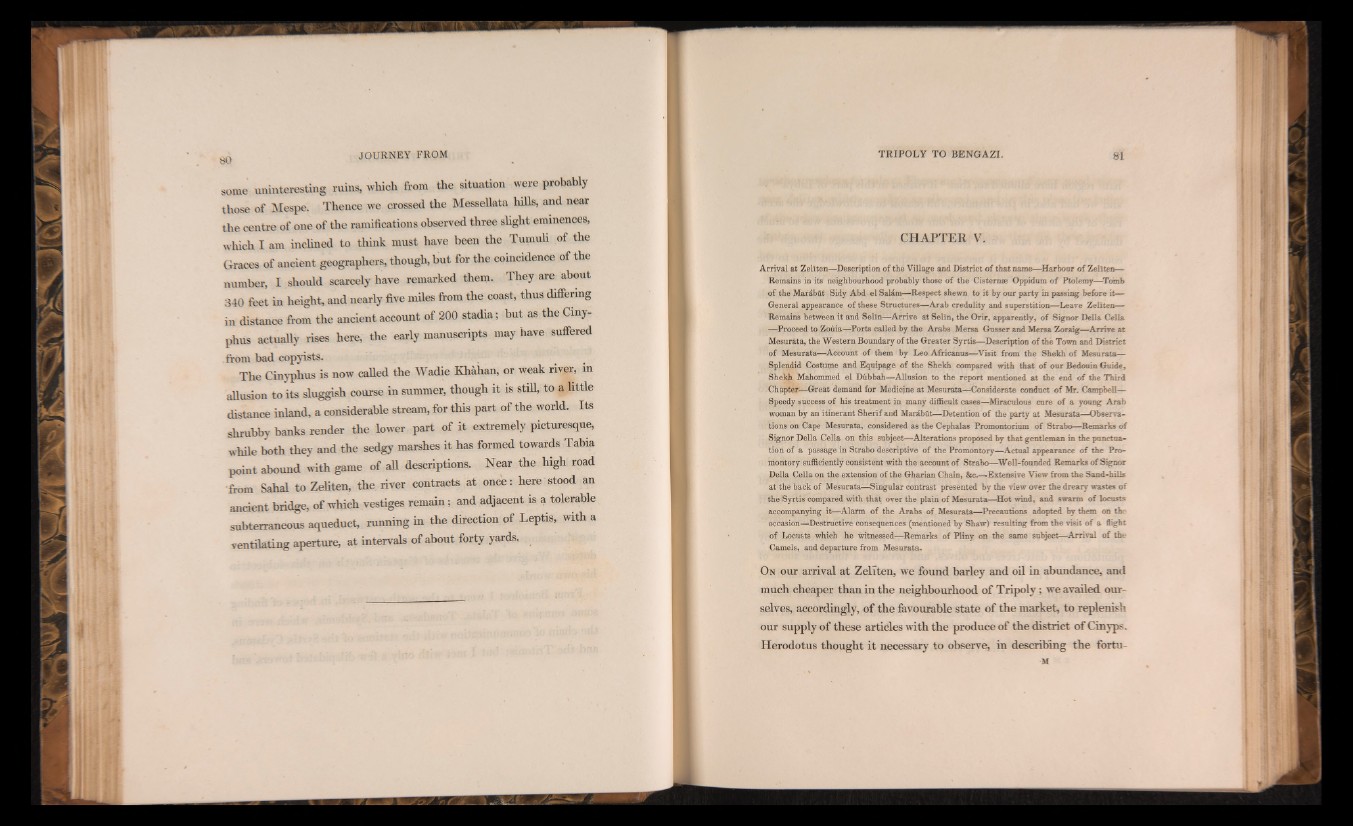
some uninteresting ruins, which from the situation were probably
those of Mespe. Thence we crossed the Messellata hills, and near
the centre of one of the ramifications observed three slight eminences,
which I am inclined to think must have been the Tumuli of the
Graces of ancient geographers, though, but for the coincidence of the
number, I should scarcely have remarked them. They are about
340 feet in height, and nearly five miles from the coast, thus differing
in distance from the ancient account of 200 stadia; but as the Ciny-
phus actually rises here, the early manuscripts may have suffered
from bad copyists.
The Cinyphus is now called the Wadie Khahan, or weak river, in
allusion to its sluggish course in summer, though it is still, to a little
distance inland, a considerable stream, for this part of the world. Its
shrubby banks render the lower part of it extremely picturesque,
while both they and the sedgy marshes it has formed towards Tabia
point abound with game of all descriptions. Near the high road
from Sahal to Zeliten, the river contracts at once: here stood an
ancient bridge, of which vestiges remain; and adjacent is a tolerable
subterraneous aqueduct, running in the direction of Leptis, with a
ventilating aperture, at intervals of about forty yards.
CHAPTER V.
Arrival at Zeliten—Description of the Village and District of that name—Harbour of Zeliten—
Remains in its neighbourhood probably those of the Cisternæ Oppidum of Ptolemy—Tomb
of the Maràbüt Sidy Abd- el Saldm—Respect shewn to it by our party in passing before it—
General appearance of these Structures—Arab credulity and superstition—Leave Zeliten—
Remains between it and Selin—Arrive at Selin, the Orir, apparently, of Signor Della Celia
—Proceed to Zouia—Ports called by the Arabs Mersa Gusser and Mersa Zoraig—Arrive at
Mesurata, the Western Boundary of the Greater Syrtis—Description of thé Town and District
of Mesurata—Account of them by Leo Africanus—Visit from the Shekh of Mesurata—
Splendid Costume and Equipage of the Shekh compared with that of our Bedouin Guide,
Shekjx Mahommed el Dûbbah—Allusion to the report mentioned at the end of the Third
Chapter-—Great demand for Medicine at Mesurata—Considerate conduct of Mr. Campbell—
Speedy success of his treatment in many difficult cases—Miraculous cure of a young Arab
woman by an itinerant Sherif and Marâbüt—Detention of the party at Mesurata—Observations
on Cape Mesurata, considered as the Cephalas Promontorium of Strabo—Remarks of
Signor Della Celia on this subjeet—Alterations proposed by that gentleman in the punctuation
of a passage in Strabo descriptive of the Promontory—Actual appearance of the Promontory
sufficiently consistent with the account of Strabo—Well-founded Remarks of Signor
Della Celia on the extension of the Gharian Chain, &c.—■ Extensive View from the Sand-hills
at:the back of Mesurata—Singular contrast presented by the view over the dreary wastes of
the Syrtis compared with that over the plain of Mesurata—Hot wind, and swarm of locusts
accompanying it—Alarm of the Arabs of Mesurata—Precautions adopted by them on the
occasion—Destructive consequences (mentioned by Shaw) resulting from the visit of a flight
of Locusts which he witnessed—Remarks of Pliny on the same subject—Arrival of the
Camels, and departure from Mesurata.
O n out arrival at Zeliten, we found barley and oil in abundance, and
much cheaper than in the neighbourhood of Tripoly ; we availed ourselves,
accordingly, of the favourable state of the market, to replenish
our supply of these articles with the produce of the district of Cinyps.
Herodotus thought it necessary to observe, in describing the fortu